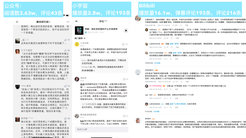Anthropology Triggers Debates in Chinese Tech Sector
On 25 March 2021, the Chinese tech giant Tencent, owner of the app WeChat with over 1.2 billion users, organised a dialogue between Biao Xiang, Director of the Department ‘Anthropology of Economic Experimentation: Frontiers of Transformation’ at the Max Planck Institute for Social Anthropology, and data engineers and economic analysts from top tech companies. Titled “Human, Algorithm and System”, the discussion was based on Xiang’s talk at the 2021 Tencent annual conference in the section “Technologies for the Good” on 9 January.

The video recording of Xiang’s January talk has been viewed more than 190,000 times online. It attracted a number of lengthy comments, including an article-length comment in Financial Times (Chinese). (“Is there value in the ‘laziness’ brought about by food delivery service – responses to Xiang Biao's Three questions.” 17 January 2021 http://www.ftchinese.com/story/001091063?full=y&archive
In his January talk, Xiang questioned the relation between algorithms and labour with a focus on time pressure at work. Implicitly drawing on Sidney Mintz’s 1960 study Worker in the Cane, he compared delivery couriers who are assigned tasks by algorithm to sugar cane workers in Latin America in the nineteenth century. The twenty-first-century riders have to travel faster and faster because the algorithm continually shortens the amount of time allowed for completing an order, which is not dissimilar to their nineteenth-century counterparts’ constant fear that their bodies would be cut by the fellow workers if they were slow as the harvest work was tightly synchronized. Xiang then explored possible impacts of the platform economy on social life in general. He suggested that a central strategy for the expansion of platform capitalism is, in his words, “capturing people”. Platform companies aim to make as many users as possible dependent on their platforms. They do so by capturing users’ attention, encouraging the adoption of new lifestyles – including “laziness”, which means the unwillingness to tolerate inconvenience –, and harvesting users’ behavioural data to provide individualized service. This is more akin to pre-modern “galactic polities” in Southeast Asia than to what we are used to. As Stanley Tambiah (1977) illustrated, galactic polities constantly strove to capture people as dependent subjects. People, instead of land or other material resources, were the main source of revenue of the rulers.

The March seminar continued the conversation between anthropology, technology, and economy. “This is really an exciting time. The tech sector is deeply interested in social theories because they don’t know what long-term implications all the technologies have and where we are heading. This created a rare opportunity for genuine cross-disciplinary dialogue”, Xiang says.

